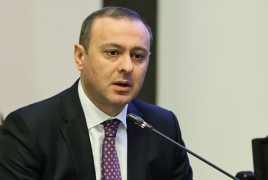
Armenian Security Council Secretary Armen Grigoryan emphasized during a panel discussion titled “The South Caucasus as a Strategic Hub: Challenges and Opportunities” at the Yerevan Dialogue conference that the Armenian government's Crossroads of Peace initiative is an economic project aimed at unblocking regional communications, fostering interconnectivity, and promoting peace and stability in the South Caucasus.
“The Armenian government has presented this proposal to regional countries as well as the global community, inviting them to engage in the project, which offers substantial prospects for prosperity and stability. Peace has many components, and one of them is economic cooperation between regional countries. As I noted, the project also creates opportunities for other nations to participate in this process,” he said, as reported by Armenpress.
Grigoryan stressed that for Armenia, it is essential that the unblocking process is based on the principles of sovereignty and jurisdiction of the regional countries, as this is crucial for peace.
“In the context of unblocking, we consider the principles of equality and reciprocity to be very important, as these are fundamental principles that create opportunities for all—not just for individual countries. Armenia is currently implementing many programs that are part of the Crossroads of Peace.
For example, the construction of the North-South highway is critical for enhancing interconnectivity and also entails the development of Armenia's infrastructure. Over the past few years, the Armenian government has been investing intensively in national infrastructure, aiming to elevate it to a level that allows for regional integration. We invite both regional countries and the global community to engage in this process and invest in regional peace,” said the Security Council Secretary.
The government has designed and introduced the “Crossroads of Peace” project centered on developing communications among Armenia, Turkey, Azerbaijan, and Iran, including the restoration, construction, and operation of roads, railways, pipelines, cables, and power lines. All infrastructures, including roads, railways, airways, pipelines, cables, and transmission lines, will operate under the sovereignty and jurisdiction of the respective countries they traverse.

